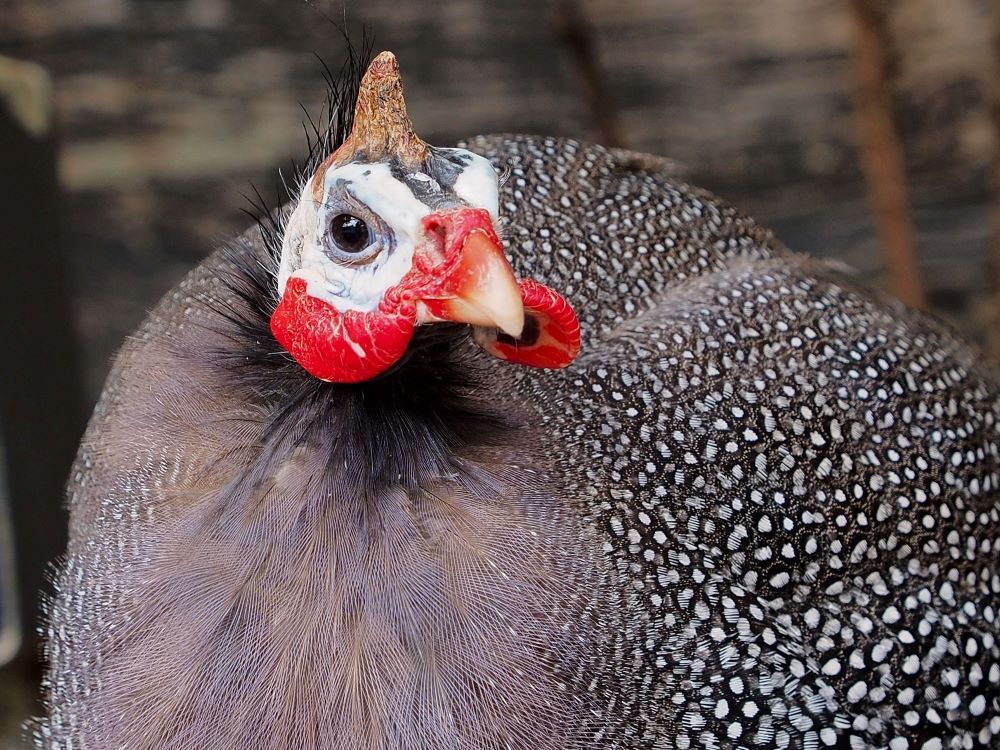It makes a sound like a rusty gate, sports black and white polka-dot feathers and loves chomping ticks.
But can a guinea fowl be a pet in Vancouver?
A provincial court judge ruled that the “rather chatty” birds kept by one resident do qualify as companion animals. Therefore, a city bylaw that prevents people from keeping “fowl” on their property does not apply, Judicial Justice Zahid Makhdoom ruled in a Sept. 12 judgment.
The saga goes back to March 2022, when a city bylaw inspector responded to a noise complaint and found two guinea fowls in a coop in Arielle Reid’s backyard on Trinity Street in East Vancouver. The jig was up, and Reid was told she had to get rid of the illicit birds.
Vancouver’s city bylaws prohibit the keeping of “horses, donkeys, cattle, swine, sheep, ducks, geese, turkeys, pheasants, quail, or other poultry or fowl.” There’s an important exception to this rule: the bylaw was modified in 2010 to allow residents to keep up to four hens — but not roosters! — in their yards, part of a growing trend to grow and raise your own food.
In his ruling, Makhdoom questioned why cats, which kill songbirds, and dogs, which bark and leave excrement on the sidewalk, are treasured as pets, but guinea fowl are not. He pointed out that in Jamaica, where Reid is from, it’s common for people to keep the useful birds, who are valued for eating ticks and scaring away snakes and other predators.
Makhdoom briefly digresses on guinea fowl in mythology: “It would not hurt to know that legend has it that guinea fowl, known by their biological name of numida meleagris, were turned to birds when Meleager, king of Calydon, was killed. Artemis, the goddess of the hunt, turned his sisters into birds who later became guinea fowls.”
But then, back to facts.
“The Disputant kept them as beloved companions, for the pure pleasure of their proximity,” writes Makhdoom. “Perhaps the same reasons many keep canines or felines, budgies or parrots.”
But wait — these animals are literally called “fowl.” And the bylaw prohibits “fowl.”
“The bylaw is a model of bland prose bereft of nuance, or concealing within its complex idiomatic layers multiple corollaries or meanings,” muses Makhdoom. He concludes that Reid’s guinea fowl have been put in the wrong category: they should be considered exotic birds, not native to British Columbia or well-suited to our wet climate.
“The only prohibition against keeping these exotic birds in the City is the limitation of how many of these could be legally kept,” he wrote. His decision? Reid can keep her beloved hand-reared birds.
This is not the first time Makhdoom, a former social justice activist originally from Pakistan, has taken on the dictates of bureaucracy.
In 2016, Makhdoom ruled in favour of a university student who had fought a $173 ticket after, she claimed, she had mistakenly grabbed her boyfriend’s bus pass.
Makhdoom said he found Inna Danylyuk’s story reasonable and questioned why TransLink was wasting the court’s time.
“Mindful of the stark dichotomy of shrinking public resources and increasing public needs, TransLink would have been better off demonstrating diligence in exercise of its fiduciary duties to the people of this province and save a student, likely already in debt, from incurring further indebtedness, or worst, waste her time with appeals and further appeals,” Makhdoom wrote in that ruling.
But TransLink applied for a judicial review of the decision, and won: BC Supreme Court Justice Robin Baird said that Makhdoom had erred when he considered Danylyuk’s reason for using the wrong bus pass because fare evasion is an absolute liability offence. That is, the justice should not have considered why Danylyuk broke the rule, only that she broke it. ![]()
Read more: Municipal Politics

















Tyee Commenting Guidelines
Comments that violate guidelines risk being deleted, and violations may result in a temporary or permanent user ban. Maintain the spirit of good conversation to stay in the discussion and be patient with moderators. Comments are reviewed regularly but not in real time.
Do:
Do not: